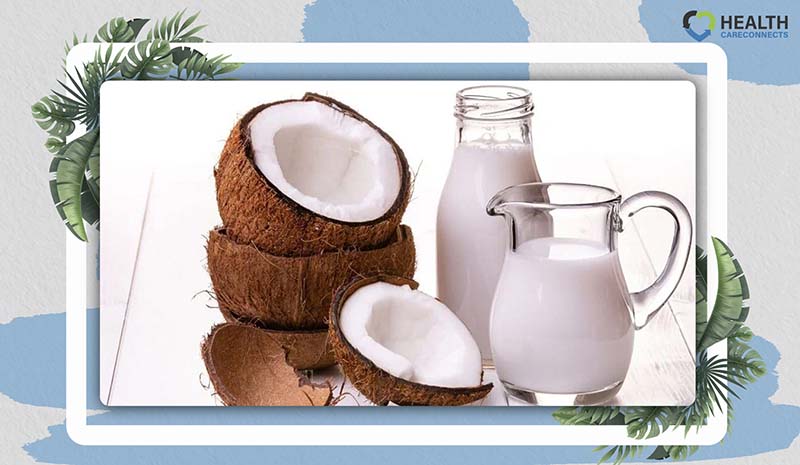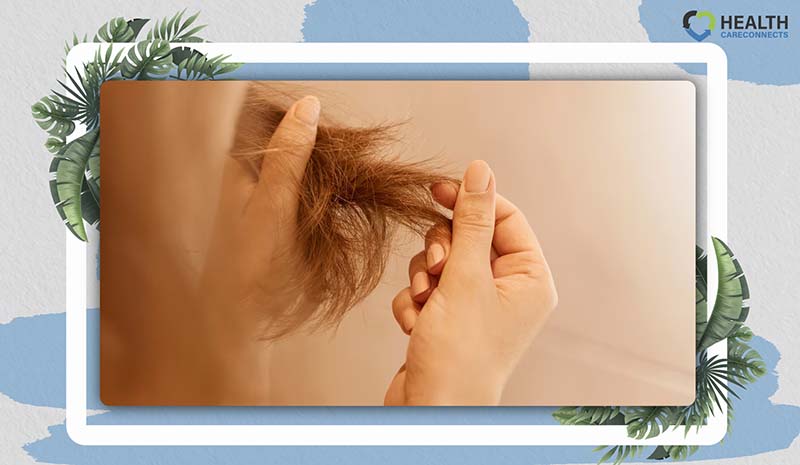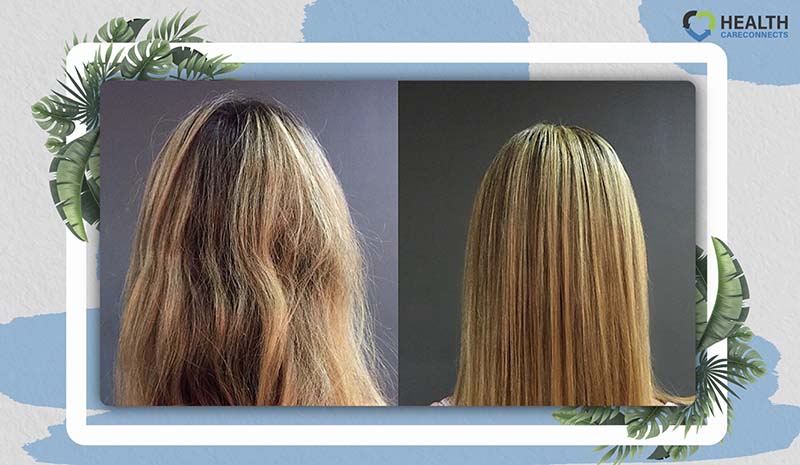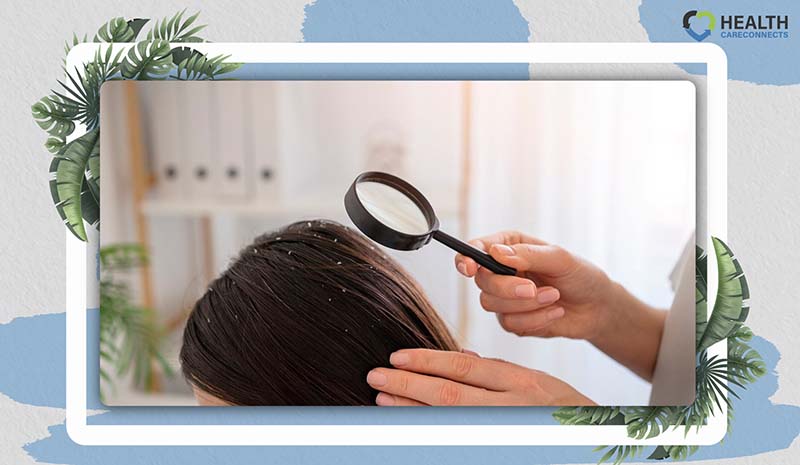In tropical paradises where coconuts dangle from tall palms, a beauty secret has been cherished and passed down through generations. Coconut milk, the creamy elixir extracted from this luscious fruit, is more than just a delicious beverage or cooking ingredient – it’s a nourishing wonder for your hair!
Explore the benefits of coconut milk and uncover how this natural remedy can transform your hair. Whether you’re dealing with frizz, longing for shine, or seeking healthy hair growth, coconut milk might just be the hair hero you’ve been waiting for.
Is Coconut Milk Good for Your Hair?
Coconut milk is highly beneficial for hair due to its content of medium-chain fatty acids (MCFAs) like lauric acid, which are similar to the fats found in human skin and hair.
These fatty acids promote scalp health by providing essential oils, antioxidants, minerals, and amino acids that help keep the scalp hydrated and protected from damage. Additionally, they effectively cleanse your hair follicles, prevent build-up at the roots, and promote strand growth.
Note:
- Incorporating coconut milk into your hair care routine can help maintain a healthy scalp and improve overall hair quality.
- Combine coconut milk with other natural ingredients like honey or yogurt for a nourishing hair mask.

Coconut Milk Benefits for Hair
When it comes to hair health, coconut milk is known to offer several potential benefits:
High in Lauric Acid
Lauric acid, a key component in coconut milk, is a medium-chain fatty acid known for its ability to easily penetrate hair and strengthen the cuticle. This helps in maintaining the structural integrity of your hair.
High in Protein
Hair is primarily composed of keratin, a type of protein. Coconut milk has a high protein profile that can potentially help keep your hair strong and resilient.
Rich in Vitamins C, E, B-1, B-3, B-5, and B-6
While macronutrients like proteins, fats, and carbohydrates are essential for overall health, micronutrients also play a crucial role. The vitamins found in coconut milk, such as C and E (antioxidants) and B vitamins, may help keep your hair healthy, strong, and moisturized.
Slows Hair Loss
Coconut oil is known for strengthening the hair cuticle, preventing breakage caused by harmful substances and water. This might reduce the rate of hair loss related to damage. However, further studies on coconut milk specifically are needed to confirm this benefit.

Restores Dry Hair and Scalp
The natural fatty acids in coconut milk have extreme moisturizing effects, which can restore both dry hair and scalp. It acts as a powerful conditioner for damaged hair.

Eliminates Dandruff
Coconut milk’s moisturizing properties can help condition both hair and scalp, potentially reducing dandruff. Additionally, coconut oil has anti-inflammatory effects that may alleviate scalp conditions like dandruff. This is why some dandruff shampoos include coconut oil along with conventional ingredients like pyrithione zinc.
Note:
- Regular use of coconut milk in your hair care routine can lead to noticeable improvements in hair texture and health.
- For best results, consider using pure coconut milk without additives or preservatives.

How to Use Coconut Milk Effectively for Hair
You can use coconut milk and related products for your hair health in the following ways:
Coconut Milk Mask for Hair Growth
Coconut milk’s deep conditioning properties make it an effective and holistic solution for hair woes. With its rich array of nutrients, it can be used all by itself as a potent hair mask.
Steps to Use Coconut Milk as a Hair Mask:
- Measure out 1/4 cup of coconut milk.
- Warm the coconut milk slightly to enhance its penetration.
- Begin by massaging it gently into your scalp for around 10-15 minutes, ensuring that you cover all areas.
- Don’t forget the tips of your hair, as the milk doubles up as a conditioner, leaving them nourished.
- Once applied, encase your hair within a shower cap.
- Let it sit and work its magic for about an hour.
- Afterward, wash your hair with your regular shampoo. You’ll likely notice a difference in texture and shine.
Coconut Milk Hair Conditioner
Did you know that coconut milk works as an excellent hair conditioner? With its silky texture, it eases the process of detangling, reducing hair breakage. The soothing properties of coconut milk can also benefit those with itchy or flaky scalps, providing moisture and relief.
Steps to Use Coconut Milk as a Hair Conditioner:
- After shampooing, squeeze out the excess water from your hair.
- Apply the coconut milk, focusing on the mid-lengths and ends of your hair, which are often the driest parts. You can massage it gently into your scalp for added nourishment.
- Let the coconut milk sit on your hair for 3-5 minutes. For those with especially dry or damaged hair, leaving it on for up to 10 minutes can provide deeper conditioning.
- Rinse your hair thoroughly with cool water. This ensures the hair cuticles close, sealing in the moisture and nutrients from the coconut milk.
Coconut Milk and Aloe Vera
Coconut milk and Aloe Vera naturally tackle hair problems, aiding in growth and scalp health. Coconut milk moisturizes, while Aloe Vera’s anti-inflammatory properties help with scalp concerns and boost hair growth.
What You’ll Need:
- 3 tablespoons of coconut milk
- 1 tablespoon of Aloe Vera gel
Steps:
- Blend together the coconut milk and Aloe Vera gel in a mixing bowl until smooth.
- Apply the blend from the roots of your hair, massaging it onto the scalp, and work it down to the tips.
- Let it sit for 30 minutes, enveloping your hair in its nourishing mix.
- Wash off with your regular shampoo and rinse with water.
- For optimal results, apply this mask twice a week.
Coconut Milk and Honey Mask
Studies show honey is effective against dandruff due to its anti-inflammatory and antioxidant qualities. It also has antibacterial, antifungal, and antiviral properties that moisturize and condition hair. When combined with coconut milk, it nourishes hair roots and enhances moisture retention, amplifying the benefits for your hair.
What You’ll Need:
- 4 tablespoons of coconut milk
- 2 teaspoons of honey
Steps:
- Mix the coconut milk and honey in a bowl until well combined.
- Massage the blend into your scalp, ensuring it covers from root to tip.
- Cover your hair with a shower cap to prevent dripping and let the mixture sit for 1-2 hours, allowing the nutrients to deeply penetrate.
- Wash your hair with a mild shampoo.
- It’s recommended to apply this mask once a week for best results.

Coconut Milk and Olive Oil
This blend of coconut milk, olive oil, and honey offers a delightful treat for your hair. A perfect combination that ensures deep hydration, strength, and shine to make your hair look and feel its best.
What You’ll Need:
- 4 tablespoons of coconut milk
- 1 tablespoon of olive oil
- 1 tablespoon of honey
- A shower cap
Steps:
- In a bowl, combine the coconut milk, olive oil, and honey.
- Gently warm the mixture for about two minutes until it’s lukewarm.
- Apply this mixture generously to your scalp, ensuring even distribution through the length of your hair.
- Use a shower cap to cover your hair, which keeps the treatment in place and intensifies its effect.
- Relax and let the mixture sit and nourish your hair for an hour.
- Rinse it out using your regular shampoo and follow up with a conditioner.
Note:
- For those with oily hair, use coconut milk sparingly to avoid excess oiliness.
- Always perform a patch test before applying new treatments to ensure you don’t have an adverse reaction.
Potential Side Effects of Using Coconut Milk for Hair
Coconut milk has few documented side effects. However, it’s always a good idea to conduct a skin allergy test in case you’re sensitive to the particular form of coconut milk at hand. It’s possible to develop a skin rash, so you’ll want to make sure the test area is clear before you apply the milk to your hair and scalp.
Due to its high fat content, coconut milk tends to have an oily texture. This may not be ideal if you already have an oily scalp and hair.
Note:
- Perform a patch test by applying a small amount of coconut milk on your forearm or behind your ear. Wait 24 hours to check for any adverse reactions.
- If you have an oily scalp, consider using coconut milk treatments less frequently or in smaller amounts to avoid excessive oiliness.
Coconut Milk Vs. Coconut Oil: Which Is Better?
Both coconut milk and coconut oil offer distinct benefits for hair care. Coconut milk is excellent for hydration and conditioning, packed with essential nutrients that nourish the scalp and promote hair growth. It also helps in detangling hair and reducing frizz.
On the other hand, coconut oil is great for penetrating the hair shaft, moisturizing from within, and protecting hair proteins, which strengthens the hair. It also has antifungal and antibacterial properties that maintain scalp health and can be used as a styling agent to shield hair from environmental pollutants and heat damage.
Using both coconut milk and coconut oil together can maximize their benefits, providing deep hydration, nourishment, and protection for healthier, more manageable hair.
Note:
- Mix a small amount of coconut oil with coconut milk to create a powerful hair mask for enhanced benefits.
- Ensure you use pure, unrefined coconut products for the best results.
How Long to Leave Coconut Milk in Your Hair?
The amount of time you leave coconut milk in your hair depends on the formula used.
- Shampoo Infused with Coconut Milk: Follow the manufacturer’s instructions, rinsing the product out after working up a good lather.
- Coconut Milk Conditioner: Leave in for a few minutes before rinsing it out in the shower.
- Homemade Hair Mask: Leave on for 15 to 20 minutes before rinsing out. This allows the nutrients to deeply penetrate and nourish your hair.
- Coconut Milk-Infused Hair Styling Products: These are designed to be left on all day or until your next shampoo session for continuous benefits.
Note:
- For homemade masks, use a shower cap to enhance the penetration of nutrients and avoid mess.
- Adjust the leave-in time based on your hair type and specific needs; those with dry or damaged hair may benefit from longer application times.
Does Coconut Milk Soften Hair?
Yes, coconut milk can make your hair soft. It is rich in essential fats, proteins, and vitamins that help to nourish and moisturize your hair, making it softer and shinier.
Which Hair Type Benefits Most From Coconut Milk?
Coconut milk is beneficial for all hair types, but it is particularly advantageous for those dealing with frizz, dryness, and brittleness. Its rich, creamy texture helps smooth frizzy hair, deeply hydrates dry strands, and strengthens brittle hair prone to breakage.
For frizzy hair, coconut milk acts as a natural emollient, taming flyaways and making hair more manageable. Those with dry and brittle hair will appreciate the intense hydration and nourishment it offers, enhancing elasticity and minimizing breakage. The lauric acid in coconut milk also helps penetrate the hair shaft, reinforcing the hair’s structure and promoting healthier growth.
Regular use of coconut milk can transform your hair, making it stronger, healthier, and more resilient, particularly if your hair typically suffers from dryness or fragility.
Conclusion
Is coconut milk good for your hair? Absolutely! Besides being nutritious and tasty, the benefits of coconut milk for your hair can be noticed after just a few applications. It effectively repairs damaged hair, moisturizes frizzy locks, reduces the appearance of dandruff, and improves scalp circulation.
To incorporate coconut milk into your hair care routine, try mixing one teaspoon with some water and adding it to your regular shampoo as a leave-in conditioner or deep treatment mask. Alternatively, you can apply it directly from the jar to achieve stronger and shinier hair more quickly!
For those seeking more information and honest product reviews, I recommend visiting HealthCareConnect.

Dr. Joyce Slater: Your Guide to Informed Health Choices
Dr. Joyce Slater shines as a distinguished expert in the field of nutrition and public health. Contributing her vast expertise to HealthConnectbc, she embodies a deep-seated passion for enhancing public well-being. As a respected figure in her field. Dr. Slater’s academic journey and professional achievements are nothing short of inspirational.
Holding a significant position as a researcher and educator, Dr. Slater has delved deeply into the intricacies of food literacy and nutritional science. Her work, prominently featured in numerous esteemed scientific publications, underscores her dedication to expanding our understanding of food’s role in health and society.
At the heart of Dr. Slater’s professional ethos is a profound desire to positively impact individual lives through education and research. She often says, “Empowering people with the knowledge to make healthier choices is the most rewarding aspect of my work.” This principle is the cornerstone of her involvement with HealthConnectbc, where she strives to provide reliable and practical health advice.
Dr. Slater’s contributions to HealthConnectbc are multifaceted: academically, she offers insights into the complex world of nutrition and health, enhancing both public understanding and professional practices. Additionally, she is instrumental in guiding and inspiring the next generation of health professionals, thus fostering future excellence in the field.
Juggling rigorous research with her educational duties, Dr. Slater demonstrates an unwavering commitment to her profession. Her approachable nature and genuine concern transcend the confines of academia, touching the lives of everyone she interacts with. Dr. Slater looks forward to continuing her journey of discovery and education, dedicated to the ongoing improvement of public health and nutrition.
At HealthConnectbc, Dr. J. Slater is not just a contributor; she is a guiding light, dedicated to enlightening and motivating individuals towards a healthier and more informed lifestyle.
PUBLISHED ARTICLES
- Food literacy competencies: A conceptual framework for youth transitioning to adulthood (2018)
- Self-perceived eating habits and food skills of Canadians (2016)
- Challenges to acquiring and utilizing food literacy: Perceptions of young Canadian adults (2016)
- Socio-demographic and geographic analysis of overweight and obesity in Canadian adults (2009)
- Sustainable well-being: Concepts, issues, and educational practices (2014)

